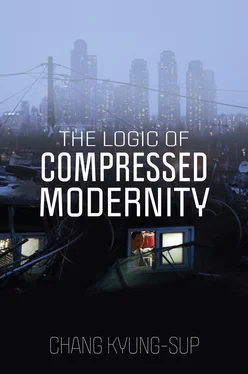Likewise, world regions are no less dynamically intensifying their unit status in political economy, culture, and even formal governance. The historic launching of the European Union as a formally legalized unit for political sovereignty as well as social and economic collaboration is certain to accelerate similarly targeted international efforts in other world regions. This European experience clearly evinces that the formal elevation of world regions as human existential units is not necessarily predicated upon the civilizational homogenization of involved societies. The extreme economic, sociopolitical, cultural, and even religious diversities within the European Union will be further complicated through now officially sanctioned reflective and reflexive interactions, engendering a wild new unit of compressed modernity (Beck and Grande 2007).
In recent decades, particularly after the global dissolution of the Cold War, Asia is following suit under the comprehensive socioeconomic integration among Asian nations, peoples, and enterprises in autonomous and pragmatic terms (Chang, K. 2014). Apparently, Asia has been evolving into a transnationally organized industrial capitalism in tandem with its formation into a grand transnational labor market, a regionalized popular cultural zone, and so forth. These dramatic and fundamental changes seem to endow Asia with a historically unprecedented materiality, which allows for its recognition as a new regional unit of (compressed) modernity.
2.4 Discussion: From Theory of Modernization to Theory of Modernitization
Modernity has been conceived as the civilizational state of affairs in a national society that has been either evolutionarily engendered (as in some Western European nations) or simulatively constructed (as in all other nations exposed to Western European influences). Both processes have been conceptualized as modernization. In sociology and its derivative scholarships, the latter category of modernization has usually been discussed and understood in terms of domestically finding or developing certain cultural, sociopolitical, and economic conditions having “elective affinities” (Weber 1946) with modern entrepreneurship, democracy, and/or liberal community. In historical realities, modernization as such could have been hoped for and tried out, but no nation outside Western Europe has ever reached modernity this nationally enclosed way. They, instead, have encountered modernity through transnational politico-military, economic, and/or sociocultural dominations. Such encounters, from the very start, made modernity an issue of relationalization with West European (and, later on, Western) civilizations and political economies. (Relationalization – as compared to relation, meaning the objective state of being related – is defined here as the act of consciously envisioning, seeking, or imposing certain relationships.) Modernity as an epistemological property began to avail and even necessitate itself wherever its embodying nations reached “pre-modern” or “non-modern” peoples/societies with existentially threatening impacts. It even began to assume the status of a meta-value in the postcolonial world. This process was no exception to the now ex-European dominant nations in the “new” continents of Americas and Oceania. Although they would ultimately be able to actively add their own characteristics in deepening and expanding modern systems of politics, economy, and society, they, as migrant settler communities, initially had to encounter Western Europe as superior forces of motherly modernity. Such sentiment is not entirely absent even now.
If the concept of modernization should remain as it has conventionally been, we need an additional concept or theory to highlight the importance of the historical processes and structural conditions of supposedly modernizing nations’ relationalization with the modernity of Western Europe (hereafter the West, considering the subsequently critical role of the United States in shaping modernity) as manifested politico-militarily, economically, and/or socioculturally. Under the epistemological condition or dilemma that modernity was already given as an inescapable historical necessity (with the implicit status of a meta-value) in the context of transnational relations of domination, modernization could not remain a natural (or indigenously realizing) social process, but became an end-determining-cause project with strong political elements. It is not so much modernity itself as the suppositionally proposed causes, whether relevantly effective (in achieving modernity) or not, that have decisively shaped the political, economic, social, and cultural conditions of a variety of postcolonial nations. Such suppositions about causes of modernity have been presented practically by all individuals, groups, and institutions with any scientific, technological, political, social, journalistic, cultural, or even religious influences in the nation. Even when the question, if certain nations have actually been modernized, remains fundamentally ambiguous, it is crucially important to find and comprehend that they have been relationalizing themselves with modernity and its embodying forces in terms of predeterminedly organizing and managing basically all elements of nationhood according to variously understood, or asserted, conditions of modernity. Let me call this process modernitization , as differentiated from modernization. This concept/theory will critically help to analyze trans-social relations of modernity in the world order, comparable to social relations of production in Marxist class analysis. Modernitization can be seen when (West-derived) modernity is appropriated, simulated, adapted, reformulated, resisted, or rescaled by peoples and societies outside its originator region of Europe. 10It will enable a proper emphasis on the significance of concrete historical agencies (as opposed to abstract structural conditions) in analyzing wide varieties of political, sociocultural, and economic transformations under the global order of modernity. 11
Some historical varieties of modernitization on the national level may be identified as follows: (1) European settler colonies in the “new” continents that would become independent nations through civilizational appropriation and adaptation of European modernity; (2) proactive instrumentalist appropriation of European modernity by non-European nations such as Japan since the Meiji revolution and a majority of postcolonial nations; (3) intra-European spread and consolidation of modernity through mutual and interactive appropriation of national and local modernities; (4) “internal conversion” (Geertz 1973) in non-European societies and peoples in terms of inventive reappropriation of indigenous or traditional civilizations for (Western-)modern tasks and purposes, for instance, as argued in the Confucian modernity thesis; (5) socialist revolution, conversion, or alliance as a national development path alternative to capitalism or capitalist modernity; (6) dialectical self-reinvention of colonized peoples and societies as counterforce elements of colonial modern systems, for instance, (ethno)nationalist civil society and proletariat confronting the colonial(ist) state and capital (see Chapter 4); (7) internal colonialist unification/subordination of minor nations and ethnicities by Europe-modeled new modern states, such as Ryukyu under Meiji Japan and Tibet under communist China. In all these instances, modernitization is a fundamentally compressed experience of modernity in the epistemological, civilizational, and/or political economic dimensions. 12Compressed modernity has been a universal mode of modernitization across the postcolonial world.
Modernitization inherently involves compressed modernity. Above all, knowing, or being forced to know, modernity – as opposed to unconsciously growing into it – is an epistemological quantum leap. But the knowing process often involves unprecedented sufferings and sacrifices imposed by the initial modernizers on the rest of the world, often through invasion, colonization, or exploitation. Thus, achieving modernity as rapidly as possible and as greatly as possible became a historical exigency in order to minimize or remove such externally originated sufferings and sacrifices in the coming years. However, once political sovereignties and/or socioeconomic autonomies were lost under colonialism, the concerned nations often lost their status as a unit of modernity and, instead, incurred instantaneous incorporation into the transnationally reorganized modernity of invader nations. In all these simple occasions of modernitization, whether self-promoted or involuntarily coerced, modernity has been reasoned, pursued, or imposed in compressed manners. More complicated occasions of modernitization do not differ, as shown in the subsequent chapters in Part II of this book as to South Korean experiences.
Читать дальше












